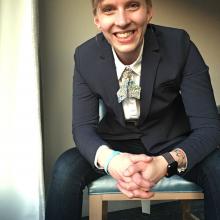Discovery Time!


Brief Abstract
Join us for a fun and interactive session centering on OLC Accelerate’s Discovery Sessions! Starting with a little bit of orientation, some guided roadmapping, and most certainly lots of key reflection and collaborative learning, this session will get us thinking about the possibilities for asynchronous online engagement.
Presenters




Extended Abstract
A staple of OLC’s Accelerate's Conference is the asynchronously presented sessions. Whether these took the form historically of a poster or more recently, a pre-prepared digital presentation, these sessions afford presenters and participants alike a unique opportunity for sustained engagement because they were designed with the asynchronous in mind. But taking the time to orient to these types of sessions in a conference setting, as well as meaningfully engage with them is not always easy, particularly given all of the other opportunities presented to us. As such, this interactive session was designed to address those two considerations specifically. We’ll start off making sure you know how to access the sessions, as well as a brief orientation to the presentation platform (PlayPosit). We’ll then spend time collaboratively engaging with the sessions themselves, with dedicated space and time to share lessons learned, things we noticed or thought were cool, and strategies we picked up along the way. Our work will be guided by an intentionally designed Discovery Session Roadmap, which will help us identify which sessions to start with and those we want to intentionally plan to get to in the future. Best of all, along the way, we’ll have a chance to talk about the many amazing and exciting possibilities for asynchronous engagement in online, digital, and blended learning environments, as well as walk away with new ideas for how to design with the asynchronous in mind. Even better, we’ll be experiencing this session in a synchronous, online format (while referencing and engaging in asynchronous content), affording us the opportunity to further reflect on these types of learning experiences.

